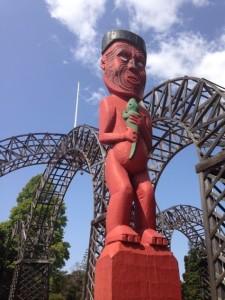The indigenous people of New Zealand are the Maori and have lived there for over 800 years, 400 years longer than Europeans have inhabited the islands. Shortly after the Europeans arrived, they wrote up a treaty (one in Maori and one in English) that they circulated to all the Maori chiefs to sign. It was called the Treaty of Waitangi. The two versions were worded differently, with the Maori one granting the indigenous people “sovereignty” over their own lands. The English version did not. The Maori signed and since then have incurred many injustices, including being deprived of their land, sacred places, and language.
My classmates and I were fortunate enough to go to the local Mauri, the sacred community center of the Maori, on Waitangi Day, which is a celebration of the treaty and acts as New Zealand’s Independence Day. There we were able to see how Maori carried out their traditions in modern times, as well as how they had fun in completely modern ways. For example, they held a Powhiri as we came in, a ceremony of welcome that involved speaking between men of each Iwi (family) and Wiatas (songs) from each group. After that, there was plentiful food and karaoke.
Hearing about Maori people’s connection to the treaty really solidified my understanding of Maori attitudes and ideals. That is that they are a people willing to move on from past transgressions with a positive attitude and work together with those that wronged them (the Europeans) to make things right. They are also a people very strongly invested in creating and maintaining a strong, welcoming community.
My thoughts about these Maori attitudes arose when we were in their Wharekai (sacred meeting room decorated with wood carvings and weavings) and they invited the community to come up and speak. They had just gotten done talking about the treaty and how the Europeans had written different versions in Maori and English and only abided by the English version, thereby going back on what was understood and agreed-to by the Maori. Despite just talking about European wrong-doings in the past, every Maori person that came up to speak talked about working together towards a stronger community. They spoke about how much they valued the people involved at the Mauri and how glad they were to welcome us there.

I also got the impression that the Maori are very cooperative and willing to work with Europeans now to compromise and make things equal. This does not mean that they do not stand up for themselves or require respect. For example, there were a series of protests in the 1970s against the seizing of land and lack of compensation for previous transgressions, including the land march from Cape Reinga to Wellington in 1975 in which the Maori (Whina Cooper, I believe) told the Europeans “Not one more acre of land.” However, they are not impatient, pushy, or disrespectful toward Europeans in the process of asking for settlement. Given what they have gone through in the past, and that their transgressions have not been completely amended, this is a feat in my mind.
This sense of cooperation and mutual respect is probably where I am seeing an attitude of moving on and making progress with a positive attitude and a smile. It was great seeing this attitude directly in the faces of Maori people there in our community.
